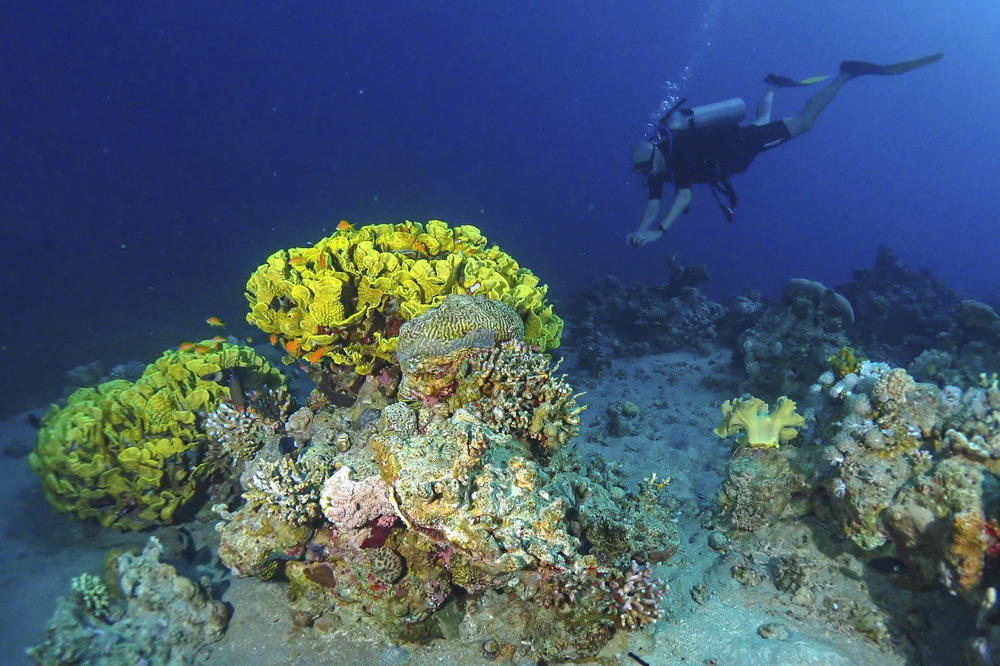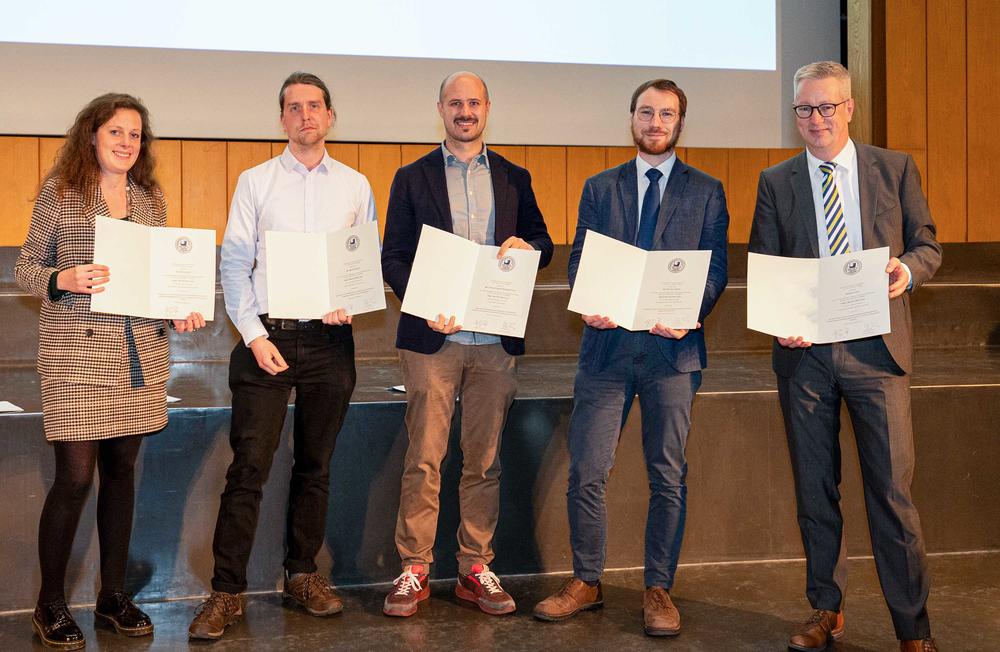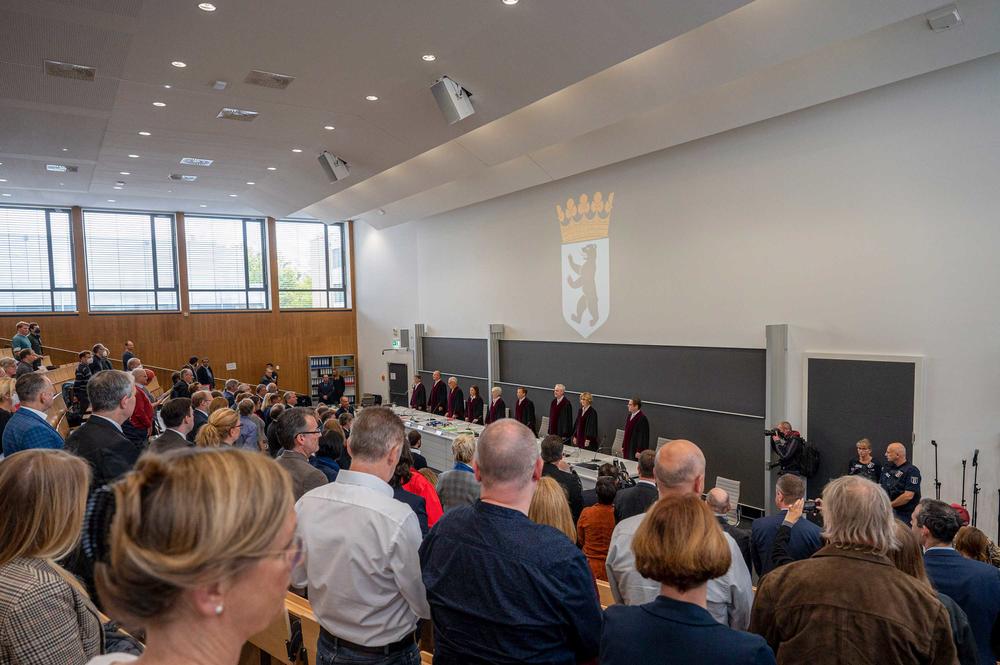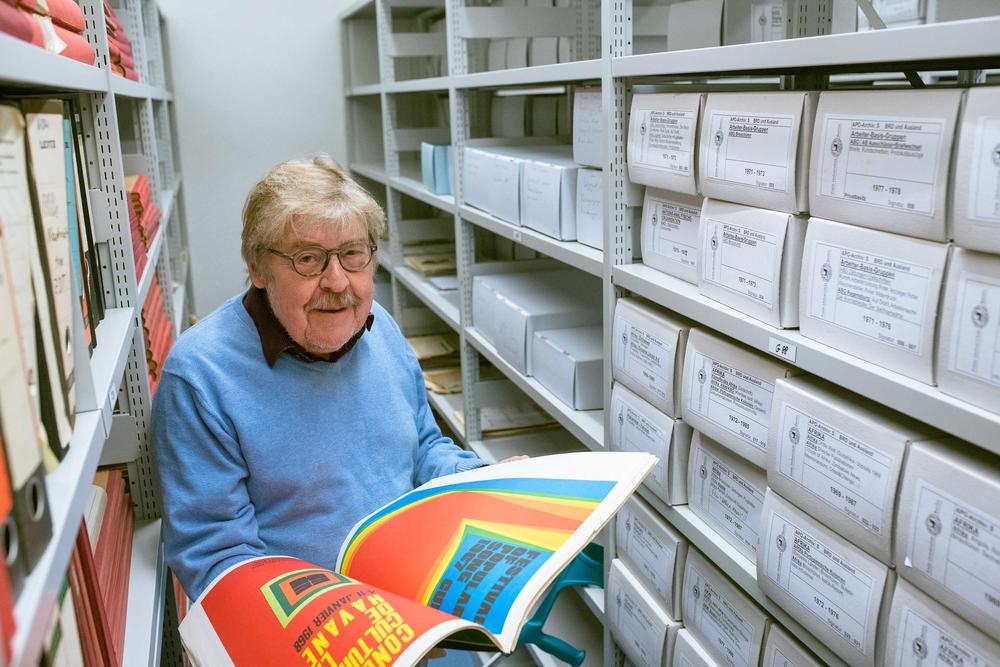Moments of the Semester
Diving for Science - The Ernst-Reuter-Prizes 2022 - A Court sits at Freie Universität - Obituary of Siegward Lönnendonker
Feb 23, 2023
Research object stone coral: Dr. Salah Amasheh, Professor Veterinary Physiology, investigates how climate change affects corals and marine biodiversity.
Image Credit: privat
Biomedical Scientist at Freie Universität Dives for Science
From Düppel to the Red Sea
Equipped with an oxygen tank, diving goggles, and fins, Dr. Salah Amasheh, professor at the Institute of Veterinary Physiology at Freie Universität Berlin, approaches a stone coral in the Gulf of Aqaba in Jordan.
Even as a child, the habilitated biomedical scientist was fascinated by the visits to his relatives who lived near the Red Sea, and in art class he drew coral reefs.
"Diving is my great passion, and it's great that I can now combine it with my profession." He has had his diving license for a long time, "the first one still looks like an old cardboard driver's license, but it's still valid!" He learned to dive in Aqaba, and since the beginning of the winter semester he has been studying in cooperation with the University of Jordan the most species-rich marine habitat: coral reefs. Due to the climate change, reef-building corals are threatened worldwide and, as a result, a species of more than 4,000 species of tropical fish and many times that number of other organism species at risk. "In the current research project, we want to investigate the regionally and species-specific resistance of stony corals to heat stress and environmental pollution at the molecular-functional level," says Amasheh, "we hope to make a possible contribution to species conservation." Research at the molecular level is increasingly taking place at the Düppel veterinary campus. "We can work in Berlin with established techniques on cultured corals and their proteins," explains the scientist. To this end, he is in exchange with the aquarium of the Berlin Zoo, among others. The scope of the research will depend on the further acquisition of funds through research proposals.
"A lot is underway here, and we are already receiving a lot of encouragement and support, for example from the department and the International Affairs department of the Freie Universität."
Awarding of the Ernst-Reuter-Prizes
President Günter M. Ziegler (left) with the winners of the Ernst Reuter Prize 2022.
Image Credit: Christoph Assmann
Freedom for research, research for freedom
Standing beaming next to University President Prof. Dr. Günter M. Ziegler (right): four winners of the Ernst-Reuter-Preis 2022. With this award, the Ernst Reuter Society annually honors outstanding doctoral theses written in the context of Freie Universität's founding anniversary. Psychologist Dr. Sophie Metz (left) provided new impetus for the treatment of post-traumatic stress disorder and borderline personality disorder; chemist Dr. Merlin Kleoff (second from left) made the breakthrough for the complex synthesis of natural substances under the exclusion of air; veterinarian Dr. Christof Bertram (center) developed the world's first image analysis software for microscopic cancer diagnosis in dogs; and political scientist Dr. Michael Giesen (second from right) investigated the influence of informal networks in international organizations. The fifth awardee, Dr. Ryanne Flock, was unable to be on site; her dissertation focused on social production in urban China and the Chinese metropolis of Guangzhou. "All of these multifaceted, complex issues are also about freedom," said Berlin's Senator for Science Ulrike Gote in her welcoming address, drawing a wide arc; and in order to preserve this freedom for future generations, Gote said, there is an urgent need for places like Freie Universität. Prof. Dr. Susanne Baer, a federal constitutional judge and alumna of Freie Universität, emphasized in her keynote address that the constitutionally guaranteed freedom of science and scholarship must be defended and never taken for granted, "because authoritarian and nationalistic currents that are directed against plurality, cosmopolitanism, and tolerance are gaining strength worldwide."
State Constitutional Court hears cases at Freie Universität
Nine judges of the Berlin Constitutional Court heard appeals against the election for the Berlin House of Representatives on September 25, 2021, in the large lecture hall of Biochemistry.
Image Credit: Bernd Wannenmacher
A court sorts the election chaos
Where scientists usually teach, men and women in black robes stand on this September day. They are the nine judges of the Berlin Constitutional Court. They are hearing appeals against the election for the Berlin House of Representatives on September 25, 2021. Due to inadequate preparation for the Berlin election, long lines had formed to vote on election day. Ballots went out, partly wrong ones were issued, the Berlin Marathon taking place at the same time caused delays. When media already reported results of the election, voting was still going on in some polling stations. Because of the great public interest in what was happening, Freie Universität had made the large lecture hall of the Arnimallee 22 building on the Dahlem campus available for the court hearing. In the course of the trial, court president Ludgera Selting will say that a "complete invalidity" of the election is a possibility. Later, the court rules: the Berlin election must be repeated.
Obituary for Siegward Lönnendonker
Dr. Siegward Lönnendonker was head of the "Archive Extra-Parliamentary Opposition and Social Movements" in the University Archive of Freie Universität.
Image Credit: Bernd Wannenmacher
Dr. Siegward Lönnendonker was a veteran of Freie Universität; he had been a member of the university since 1958. He began studying physics and mathematics there in 1958 and switched to sociology, political science, and psychology in 1963. During this time, he also began his political involvement in the German-Israeli Study Groups, of which he was the national chairman in 1964. In this capacity, he also co-initiated a collection of signatures for the establishment of diplomatic relations with Israel. In addition, in the 1960s he belonged to the Socialist German Student League, whose leaflets and posters he avidly collected during his student days. This was the beginning of his later professional career as head of the "Archive of Extra-Parliamentary Opposition and Social Movements" in the University Archive of Freie Universität. With Dr. Tilman Fichter, Lönnendonker published the first volume of the documentation "Hochschule im Umbruch" in 1973. Six volumes of this documentation appeared until 1990. After that, he and Prof. Dr. Karol Kubicki (matriculation number 1 of Freie Universität) edited a seven-volume history of science at Freie Universität. Music was no minor matter for Lönnendonker. As bass player and manager of the "Metropolitan Jazz Band," he was known in Berlin's hip music venues. On the night of September 2 to 3, 2022, Lönnendonker died at the age of 83. He now rests in the Lichterfelde Park Cemetery with Otto Dibelius, Sebastian Haffner, Kurt von Schleicher and Drafi Deutscher.




